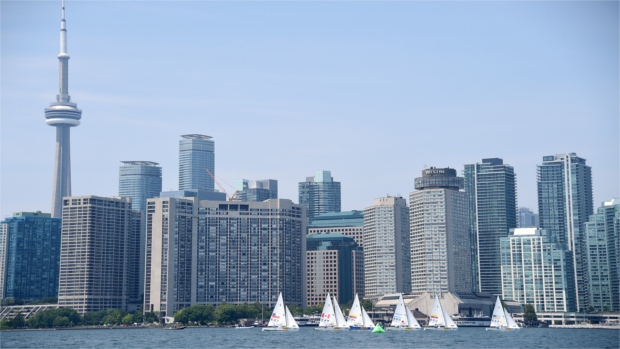Olympic bid still costly for Toronto, expert says
Researcher questions new rules on financial sustainability
Olympics officials say new rules meant to make hosting the Games more affordable would also cut the cost of bidding for the international competition.
But at least one expert disputes those claims, saying the new measures brought in by the International Olympic Committee only pay lip service to financial sustainability and won’t make the pitch or the Games themselves any cheaper.
Financial concerns have been at the forefront as Toronto considers whether to vie for the 2024 Summer Games, and the city’s mayor has said he won’t decide until preliminary figures from this summer’s Pan Am and Parapan Am Games are released.
The deadline for cities to register their interest with the IOC is Sept. 15.
A municipal study previously estimated it would cost roughly $50 million to bid for the Games, on top of the $150,000 application fee.
The Canadian Olympic Committee, which has been pushing for Toronto to throw its hat in the ring, says sweeping changes recently enacted by the IOC would reduce the price of a bid, though it couldn’t say by how much.
“We can safely say the cost of a bid would be substantially lower than what has been the case in the past,” spokesman Carl Vallee said in an email.
Bid could cost $50M-plus: researcher
With its new plan — dubbed Agenda 2020 — the IOC “wants to make Olympic Games more accessible and financially sustainable,” he said. “In that spirit, it wants to attract as many candidate cities as possible, thus making the cost of bidding lower.”
But Janice Forsyth, director of the International Centre for Olympic Studies at the University of Western Ontario, says a bid alone will likely cost more than $50 million, much of it from the public purse.
The new rules have changed the application process but not the related expenses, she said.
“As far as we’re concerned, all of the accountability measures that the IOC has put in place to make an assessment haven’t changed,” she said.
“There’s a few concessions about how some of the visits might be paid for but the city and the region still have to do their due diligence in terms of weighing the opportunity costs of bidding and hosting, and those haven’t changed.”
In fact, she said, “they’ve only gotten more expensive because every bid has to best the previous one.”
Public funds covered half of Vancouver bid cost
The changes frame the application process as an invitation and allow potential candidates to seek advice from the IOC about the requirements and how previous hosts have fared. They also encourage cities to make use of existing or temporary facilities instead of building everything from scratch.
But it’s unclear how the rules will be applied, Forsyth said.
“You take this already high-risk situation and you make it even riskier with Agenda 2020 because of so many unknowns,” she said.
“It’s just not a good time to bid or host under these circumstances because at the end of the day, bid cities are still going to be in competition with one another to win the IOC’s favour and you can bet those price tags are going to be huge.”
It cost Vancouver $34 million to bid for the 2010 Winter Olympics, but Forsyth said competing for the sought-after Summer Games is more expensive.
More than half of the bill for the Vancouver bid — about 54 per cent — was paid by various levels of government and public agencies, with the rest covered by private-sector funding, documents show.
Toronto last bid for the 2008 Summer Games but lost to Beijing. The city also made a pitch for the 1996 Olympics, which were held in Atlanta.
0

